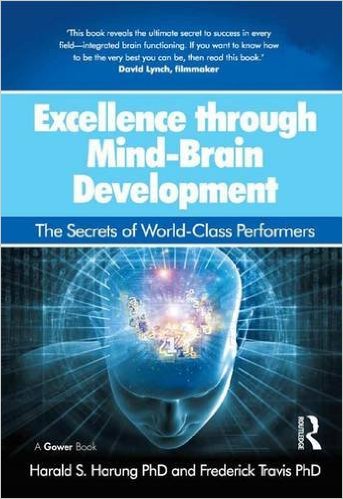Ádám Olgyay
Harald Harung and Frederick Travis (2016). Excellence through Mind-Brain Development: The Secrets of World Class Performers. London, UK. Routledge.
 We all want excellence and happiness. Thousands of books have been written on the topic of high performance and the secrets of success. There are two basic challenges. First, there are many competing ideas of what underlies high performance. Second, it has proven difficult to implement the theories in practice. From the huge complexity of this field, the following questions thus emerge: What is the most critical factor in success and how can it be implemented?
We all want excellence and happiness. Thousands of books have been written on the topic of high performance and the secrets of success. There are two basic challenges. First, there are many competing ideas of what underlies high performance. Second, it has proven difficult to implement the theories in practice. From the huge complexity of this field, the following questions thus emerge: What is the most critical factor in success and how can it be implemented?
In their book, Harald S. Harung PHD and Frederick Travis PHD introduce a Unified Theory of Performance, which is a simple, yet a comprehensive view of performance. They examined the secret of world-class performance and suggest that excellence in any profession or activity primarily depends on the single factor of high mind-brain development. What does it really mean? They found that top performers tend to have a much more orderly, restfully alert, and economic brain than average performers. The brain is a very concrete thing. Therefore, it is easy for every human to understand his or her level of performance from this aspect.

Ádám Olgyay
According to the authors’ findings it seems that for success, who we are (e.g., our level of brain integration) is much more important than the knowledge, skills and relationships we have and what we do. Because with higher mind-brain development, our knowledge and skills become more useful, our relationships more enriching, and our actions more effective. As the level of performance is a key factor in any field of life, the knowledge of how to develop it by enhancing mind-brain development is essential for all the leaders of the world.
The discovery we can read about in this book has emerged from the more than 10-year collaboration of the two authors. Harald S. Harung PHD brought in management models and thinking and Frederick Travis PHD brought in research on brain maturation and the association of brain functioning with psychology and behavior. They recorded brain waves and interviewed professional musicians in Swedish and Norwegian concert halls, measured professional Norwegian athletes who for at least three seasons had placed amongst the ten best in the world, and sat in the CEO’s office of major Norwegian corporations explaining how brain integration is the basis of creative solutions and continued progress in the challenging business world. The results presented in their book are fascinating. And the good news is that everyone can easily learn how to develop the basic factor that has been found in world-class performers.
First of all, let us start with some psychology from a very exciting point of view. The Western discipline of psychology, the authors say, is useful, but has its limitation since it focuses on the development of individual psychology and personality, and often overlooks peak experiences, which according to Abraham Maslow are the happiest and most fulfilling moments in life. In contrast to this, higher consciousness – in other words lasting peak experiences – has been the primary focus in the Vedic tradition of India. This tradition also offers techniques that individuals can use to systematically cultivate such high development. According Maharishi Mahesh Yogi, world-leading expert in Vedic knowledge, the mind is a hierarchy of processing levels that determines what we perceive and how we respond to the environment. The most fundamental level is called Transcendental Consciousness, which is beyond even our individual ego, which gives us the sense of “I” or the “experiencer”. Reaching Transcendental Consciousness, thinking and feeling settle down completely. In this state self-awareness is maintained without mental activity. This is beyond individual personality – transpersonal -, the aspect of our life that never changes.
Many of the qualities of Transcendental Consciousness have been discussed in modern science as peak experiences, which Maslow described in terms of “going beyond and above selfhood,” “transcendence of time and space,” and “fusion with the world.” During peaks, Transcendental Consciousness is experienced either on its own or coexisting with activity. Performance during a peak experience is characterized by bliss, inner calmness even amidst dynamic activity, effortlessness, spontaneous right action, freedom from fear, a sense of invincibility, and world-class performance. Therefore, we can say that real success in outer behavior depends on using all levels of the mind, especially the most fundamental level, Transcendental Consciousness.
Before we review the practices to develop the basis of peak performance, let us have a look at how we can unfold the phenomena of peak performance in a scientific way and what concrete findings there are from the studies conducted by the authors. In their model of successful performance, the authors proposed four performance dimensions: (1) Brain functioning – the level of orderliness and economy of brain functioning. (2) Individual psychology – the depth and breadth of mental and feeling functioning. (3) Peak experiences – the frequency and persistence of peak experiences. (4) Social context – the level of development of the organization and society in which the performer operates. Therefore, the theory says that the dynamic interplay of brain functioning, individual psychology, and peak experiences within the ever-changing social and environmental settings fundamentally determines the individual’s level of performance.
The authors conducted matched studies to document the relation between inner mind-brain development – the first three dimensions described above – and outer success. Then a measure called the Performeasure Assessment was calculated from the data from each of the studies of athletes, managers, and musicians. This measure is hypothesized to differentiate top performers from average performers in the same profession. Let us see the results in short: (1) Top athletes scored significantly higher on brain integration, better psychology (moral reasoning and ego or self-development), and speed of ignoring distractions than average-performing athletes. (2) Top-level managers scored significantly higher on all three measures of mind-brain development – brain integration, moral reasoning and one category of peak experiences – than control managers. (3) And professional musicians also scored higher on moral reasoning, three categories of peak experiences, a brain test of vigilance, and a measure of speed of mental processing than amateur classical musicians. When summing the data into the Performeasure assessment the difference between the top and average performers was highly significant for all three professions. Therefore, it seems that behind peak performance is always higher mind-brain development.
Although the results are quite convincing we have to ask the question whether there are any alternative factors that may explain performance level? Form extensive meta-analyses we know that the number of years of education accounts for only 1 percent of performance levels, work experience only 3 percent, and age in adults 0 percent. Incentive programs may work for simple, manual work, but tends in the long run to even be detrimental for performance level in more sophisticated knowledge work, which of course is more and more common. The only other factor that might have significant bearing is the talent we are born with. However, talent is more readily recognized and brought out with higher mind-brain development. Therefore, we can conclude that mind-brain development is by far the most important factor for excellence, which means that success comes from within.
And finally the million-dollar question: How can we achieve excellence? In other words, how can we develop our brain functioning and refine our mind to perform on the highest level? The authors describe three complementary strategies to enhance mind-brain development: (1) psychical exercise, (2) enjoying music, and (3) transcending. Without going into the details, we can say that psychical exercise and music have real but limited effects on mind-brain development. Transcending, either spontaneously or through meditation practices, leads to higher frontal brain blood flow and higher frontal alpha1 (8-10 Hz) EEG coherence. In this rewarding state the brain is functioning as a whole. And repeated experiences of transcending help to culture brain connections, leading to higher brain integration throughout the day. Research shows that this most fundamental experience enhances all the four dimensions of performance reviewed above.
However, how can we get to this state, how can we learn to transcend? Is it possible for everyone? The answer is yes, absolutely – the book says. There is a technique called Transcendental Meditation that can easily help. This is a simple and effortless technique without concentration, control, and belief that allows the mind spontaneously to settle down and creates optimal brain functioning. So it seems among the three strategies transcending is the most effective way to develop high mind-brain development, but even better doing all three as they are complementary to each other.
In conclusion, we can say that this book has a revolutionary perception, yet it is so simple: To transform performance, we need to transform the performer. There is nothing abstract in it, since in the center of this idea is a very concrete thing, the brain. From Excellence through Mind-Brain Development, we can get to know – with all the details – how to enhance our mind-brain development to improve our performance in general and leadership in particular. The authors guide us through their theory and collected experiences in a very throughout yet smooth way. As the world-famous filmmaker, David Lynch said about their work: “This book reveals the ultimate secret to success in every field – integrated brain functioning. If you want to know how to be the very best you can be, then read this book.” The book can be ordered from www.brainintegrationsystems.com.
About the Author
Ádám Olgyay is a sociologist. He finished his studies in 2015 at the University of Szeged in Hungary. In his MA thesis he dealt with specific aspects of the problems of the educational system in Hungary and in common as well. The title of his work was ‘Stress in School – Consciousness Based Education’. He also attended many courses in the topic of personal development, high performance and leadership. As a member of the Enlightened Leadership International organization his mission is to help individuals and organizations become effective in the field of leadership.

Very informative.For mind development education in mother tongue is more useful.Whats your opinion